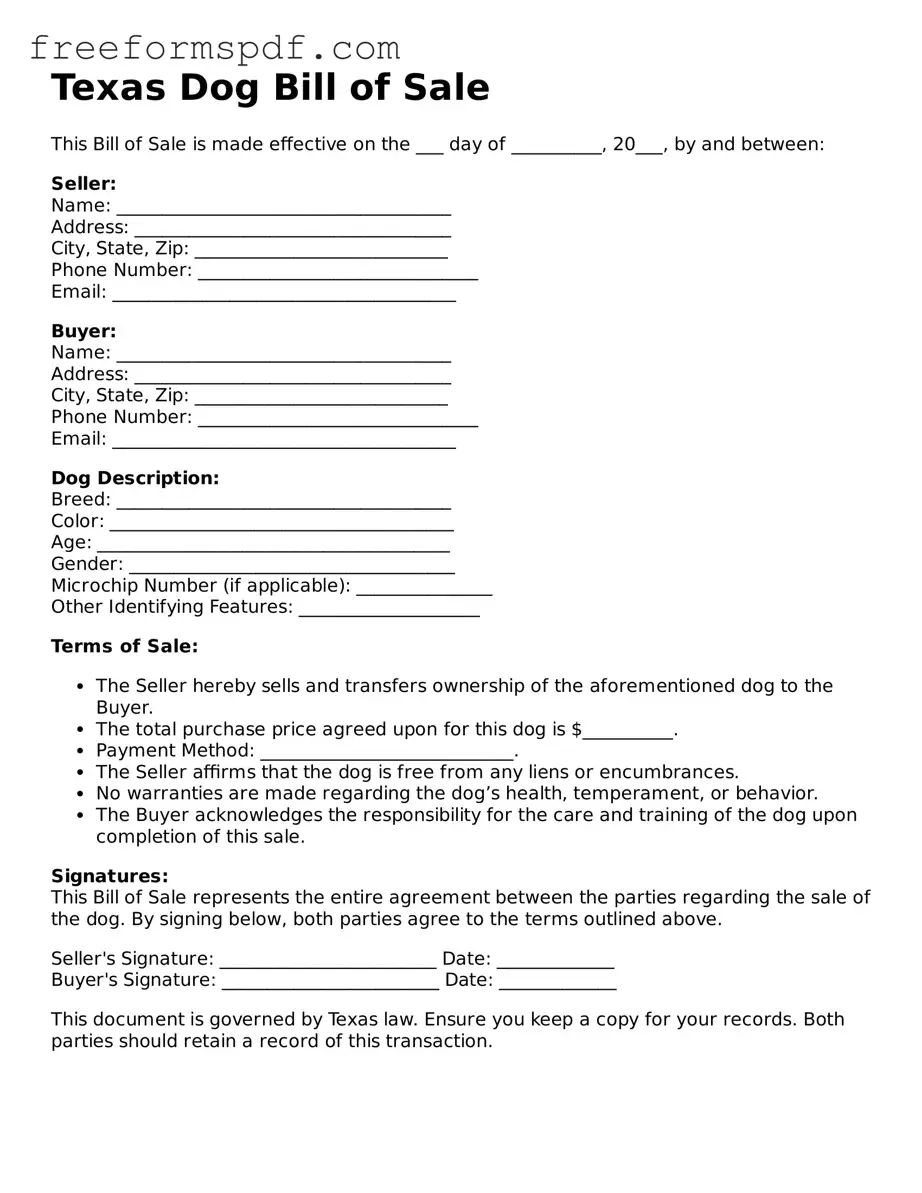Attorney-Verified Dog Bill of Sale Document for Texas State
Common mistakes
-
Incomplete Information: Many people forget to fill out all required fields. This includes the seller’s name, buyer’s name, and details about the dog. Leaving any section blank can lead to issues later.
-
Incorrect Dog Details: Some individuals make mistakes when entering the dog's breed, age, or health status. Providing inaccurate information can create confusion and potential disputes.
-
Failure to Sign: It's common for sellers or buyers to overlook signing the document. Without signatures, the bill of sale may not be legally binding.
-
Not Keeping Copies: After completing the form, some forget to make copies for both parties. Having a copy is essential for future reference and proof of the transaction.
Learn More on This Form
-
What is a Texas Dog Bill of Sale?
A Texas Dog Bill of Sale is a legal document used to transfer ownership of a dog from one person to another in the state of Texas. This form serves as proof of the sale and includes important details about the dog and the parties involved in the transaction.
-
Why do I need a Dog Bill of Sale?
This document is essential for establishing ownership and can help prevent disputes in the future. It also provides a record of the transaction for both the seller and the buyer, which can be useful for any legal or veterinary needs that arise later.
-
What information is included in the Dog Bill of Sale?
The form typically includes the following details:
- The names and addresses of both the seller and the buyer.
- A description of the dog, including breed, age, color, and any identifying marks.
- The sale price and payment method.
- The date of the sale.
- Any warranties or guarantees regarding the dog’s health or behavior.
-
Is the Dog Bill of Sale required by law?
While it is not legally required to have a Dog Bill of Sale in Texas, it is highly recommended. This document can protect both the buyer and the seller by providing clear evidence of the transaction.
-
Can I create my own Dog Bill of Sale?
Yes, you can create your own Dog Bill of Sale. However, it is important to ensure that it includes all necessary information to be effective. Many templates are available online that can guide you in creating a comprehensive document.
-
Do I need to have the Dog Bill of Sale notarized?
No, notarization is not required for a Dog Bill of Sale in Texas. However, having it notarized can add an extra layer of legitimacy to the document and may be beneficial in case of future disputes.
-
What if the dog has health issues?
If the dog has known health issues, it is important to disclose this information in the Dog Bill of Sale. This transparency can help avoid misunderstandings and potential legal issues down the line.
-
Can I include a return policy in the Dog Bill of Sale?
Yes, you can include a return policy in the Dog Bill of Sale. If you wish to allow the buyer to return the dog under certain conditions, clearly outline these terms in the document.
-
What should I do if I lose the Dog Bill of Sale?
If you lose the Dog Bill of Sale, it’s a good idea to create a new document. Both parties can sign it again, ensuring that the details remain consistent. Keeping a copy of the original is always advisable for future reference.
-
Where can I find a Texas Dog Bill of Sale template?
Many websites offer free or paid templates for a Texas Dog Bill of Sale. Ensure that the template you choose is tailored for Texas laws and includes all necessary information for your transaction.
Misconceptions
When discussing the Texas Dog Bill of Sale form, various misconceptions often arise. Understanding these misconceptions can help ensure that both sellers and buyers are well-informed about their rights and responsibilities. Here are six common misunderstandings:
- The form is only necessary for purebred dogs. Many believe that a Bill of Sale is only required for purebred dogs. In reality, it is advisable for all dog sales, regardless of breed, to have a Bill of Sale to document the transaction.
- A verbal agreement suffices. Some individuals think that a verbal agreement is enough to finalize a dog sale. However, having a written Bill of Sale provides clear evidence of the transaction and protects both parties in case of disputes.
- The form must be notarized. Many assume that notarization is a requirement for the Bill of Sale to be valid. In Texas, notarization is not necessary, although it may add an extra layer of authenticity.
- The seller is responsible for all future health issues. There is a misconception that the seller is liable for any health issues that arise after the sale. The Bill of Sale can include clauses that clarify the extent of liability, often stating that the buyer accepts the dog "as is."
- Only breeders can use the form. Some people think that only professional breeders can utilize the Bill of Sale. In fact, any individual selling a dog can use this form to formalize the transaction.
- The form is only for sales. It is a common belief that the Bill of Sale is only applicable for sales transactions. However, it can also be used for transfers or gifts of dogs, providing a record of the change in ownership.
By addressing these misconceptions, both sellers and buyers can navigate the process of dog ownership transfer more effectively, ensuring a smoother transaction.
